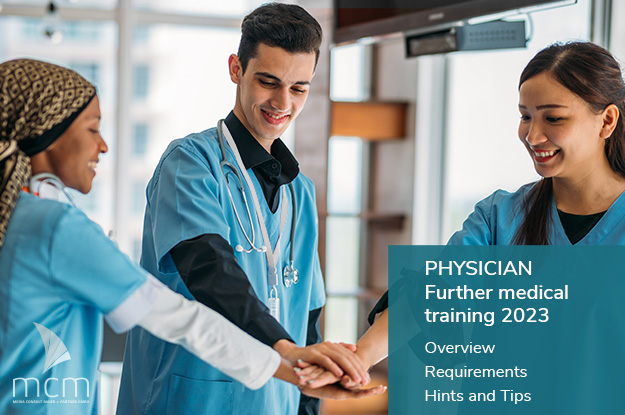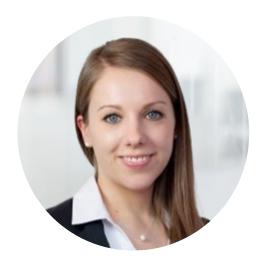Your pathway to a specialist title
You have successfully completed your medical studies in a European or non-European country and are wondering what to do next. With this and subsequent articles, we want to take a closer look at the topic of further training in Germany.
Would you like to specialise further, learn additional skills and acquire the competence to treat patients in a specific field? Then start further medical training and acquire a specialist title in Germany. We have compiled all the important information on this for you below.

Residents in further training to become specialists
Requirements
Anyone wishing to become a doctor in further training or an assistant doctor and acquire a specialist title in Germany must have a professional licence to practise medicine (Approbation) and, if applicable, proof that they have passed the specialist language examination.
Course of continuing medical education
Further training to become a medical specialist takes place in a full-time employment relationship with appropriate remuneration. It may only be carried out at approved training centres under the direction of doctors who are authorised to carry out further training by the State Medical Association of the respective federal state. All addresses of authorised doctors and training centres are listed on the website of the state medical association of the respective federal state. Internet pages of the Landesärztekammer
Each Land has its own further training regulations (WBO), which are issued by the Land Medical Association and are usually based on the model further training regulations of the Federal Medical Association. The WBO regulates the course and duration of continuing medical education. It lists all specialties in which a specialist title can be acquired and specifies all minimum required further training contents and further training periods. Model further training regulations of the Bundesärztekammer
The duration of postgraduate medical training varies according to the speciality and covers four to six years. It is precisely specified what proportion of the training period must be completed in the inpatient or outpatient sector. All training periods must be recorded in a logbook and confirmed by the supervising training officer. After successful completion of the training period, the doctor in further training receives a certificate and can finally register for the specialist examination at the State Medical Association. Prerequisites for admission to the examination are proof of the completed further training content and time in the form of the logbook and certificate, as well as membership of the competent state medical association. The examination takes the form of an interview and usually lasts at least 30 minutes. After passing the examination, the candidate receives a certificate and may from now on bear the acquired title of specialist and work in the corresponding field.
Overview of the specialist titles listed in the Further Training Ordinance (WBO).
In Germany, there are a total of 34 specialist areas plus additional areas of specialisation in which a specialist title can be acquired, according to the further training regulations of the German Medical Association. In total, there are more than 50 possible specialist titles in Germany. Continuing education regulations of the Bundesärztekammer
- Anesthesiology
- Anatomy
- Biochemistry
- Child and adolescent psychiatry and psychotherapy
- Forensic Medicine
- General Medicine
- Gynecology and obstetrics
- Human Genetics
- Hygiene and environmental medicine
- Internal medicine
- Internal medicine and angiology
- Internal medicine and cardiology
- Internal Medicine and Endocrinology and Diabetology
- Internal medicine and gastroenterology
- Internal Medicine and Hematology and Oncology
- Internal medicine and infectiology
- Internal medicine and nephrology
- Internal medicine and pneumology
- Internal Medicine and Rheumatology
- Laboratory Medicine
- Microbiology, virology and infectious disease epidemiology
- Neurology
- Neurosurgery
- Nuclear Medicine
- Occupational Medicine
- Ophthalmology
- Oral and Maxillofacial Surgery
- Otolaryngology
- Pathology
- Neuropathology
- Pediatrics and adolescent medicine
- Pharmacology
- Clinical pharmacology
- Pharmacology and toxicology
- Phoniatrics and Pediatric Audiology
- Physical and rehabilitative medicine
- Physiology
- Psychiatry and psychotherapy
- Psychosomatic medicine and psychotherapy
- Public health
- Radiology
- Radiotherapy
- Skin and venereal diseases
- Surgery
- General Surgery
- Vascular Surgery
- Cardiac Surgery
- Pediatric and adolescent surgery
- Orthopedics and trauma surgery
- Plastic, Reconstructive and Aesthetic Surgery
- Thoracic Surgery
- Visceral Surgery
- Transfusion Medicine
- Urology
Specialties and specialisation options for acquiring the title of specialist according to the Model Continuing Education Ordinance of the Federal Medical Association
Acquisition of a speciality or additional designation in continuing medical education
Those who already hold a specialist title can additionally acquire a specialisation or additional title by completing a further medical training course.
Further training to obtain a specialist title
Further training to obtain a speciality designation is a further specialisation in the same field in which the specialist title was also acquired, e.g. specialist in paediatrics and adolescent medicine with a speciality in neonatology or specialist in gynaecology and obstetrics with a speciality in gynaecological oncology. The specialisation training usually lasts two years.
Further training to obtain an additional title
Further training to obtain an additional title includes specialisation in further training content that is acquired in addition to the specialist title and thus does not necessarily have to be based on a specific speciality. Examples of additional titles include acupuncture, allergology, geriatrics, nutritional medicine or sleep medicine. The model WBO of the German Medical Association lists a total of 56 such possible additional designations.
How to find a suitable postgraduate training position
Would you like to obtain your specialist title in Germany and are you looking for a position as a doctor in further training? Then become part of our Medical Talent Network now and benefit from the support of our experienced recruiting team during your application process as well as from our nationwide contacts to clinics and medical institutions. Or apply directly in our job portal for one of the numerous vacancies for doctors.
Read also our article on the ten most popular residency programs
Are you interested in further medical training in Germany?
Please apply directly here:
Medical Talent Network
---
Sources:
Bundesärztekammer (2023): Ärztliche Weiterbildung - Bundesärztekammer. https://www.bundesaerztekammer.de/themen/aerzte/aus-fort-und-weiterbildung/aerztliche-weiterbildung. Retrieved on 23.03.2023.
Bundesärztekammer (2022): (Muster-)Weiterbildungsordnung 2018 in der Fassung vom 25.06.2022. https://www.bundesaerztekammer.de/fileadmin/user_upload/BAEK/Themen/Aus-Fort-Weiterbildung/Weiterbildung/20220625_MWBO-2018.pdf. Retrieved on 23.03.2023.
Foto: istockphoto | simon2579

